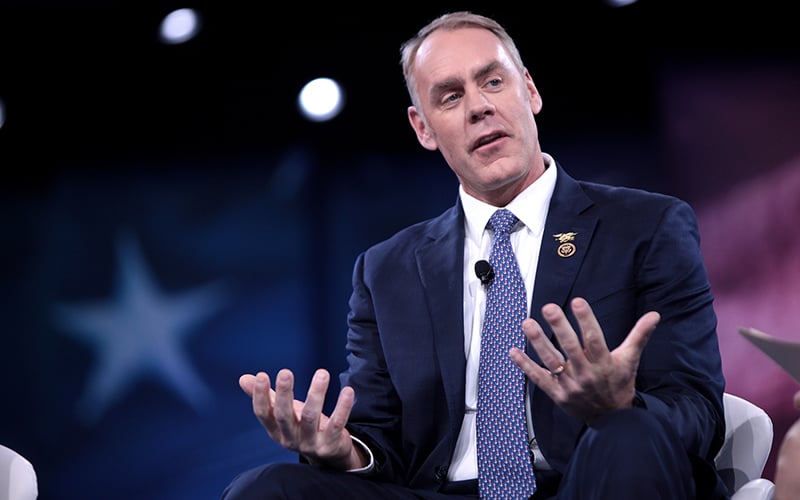
Interior Secretary Ryan Zinke, in a 2016 photo, has raised some concerns among enviromental groups, but promised to be true the vision of Teddy Roosevelt in his new job. (Photo by Gage Skidmore/Creative Commons)
WASHINGTON – Environmental groups said Wednesday they will keep a close eye on new Interior Secretary Ryan Zinke, a former Montana congressman who they see as having a mixed record on the environment.
“Starting on day one at the Interior Department, we’ll see which Ryan Zinke shows up,” Center for Western Priorities Executive Director Jennifer Rokala said in a statement after the Senate voted 68-31 to confirm Zinke’s nomination Wednesday.
“The one who voted to grease the skids for selling our national public lands or the one with a backbone to stand up to some of Congress’ very worst instincts,” her statement said.
But supporters welcomed the confirmation, saying the former Republican congressman has shown he can work across party lines and that he cares about protecting the environment, something even his critics concede.
Tribal officials, too, said they had a good relationship with Zinke in Congress and they look forward to working with him as secretary.
“I am confident that we will benefit greatly from his lack of concern for partisan politics as well as his steadfast dedication to what is best for our country and our lands,” Rep. Paul Gosar, R-Prescott, said in a statement after the confirmation.
Zinke, a fifth-generation Montanan and former Navy SEAL, said in a statement after his confirmation that he is committed to upholding Theodore Roosevelt’s vision for preserving public lands for the benefit of the American people.
“Our public lands can once again be economic engines for our nation by creating jobs in energy, recreation, and conservation,” Zinke’s statement said. “By working with President Trump and Congress to re-evaluate and fix flawed regulations that are barriers to job creation, we will unleash the economic opportunity within our borders.”
That sort of talk worries environmental groups such as the Sierra Club, which said a “key concern” about the former Montana lawmaker is his history of supporting “extractive development” on public lands for oil, gas, coal and other mining interests over the protection of those lands.
“We’ve already seen a lot of attempts to weaken protection for public lands,” said Sandy Bahr, director of the Sierra Club’s Grand Canyon Chapter. “And you want an interior secretary that’s really looking out for protection of the lands, protection of wildlife.”
In Arizona, Bahr said her chapter is concerned that Zinke won’t maintain an Obama administration ban on uranium mining on 1 million acres around the Grand Canyon.
Athan Manuel, director of the Sierra Club Lands Protection program, said the 20-year moratorium on mining and development projects that was signed in 2012 can’t be scrapped easily – there would need to be a public comment period before changes are made. But Manuel said the Sierra Club worries that Zinke, facing pressure from Trump administration officials who support land development, could cut the ban short in two years or less.
The organization does not doubt Zinke cares about protecting the environment, Manuel said, but is not convinced he will always act to do so.
Rep. Raul Grijalva, D-Tucson, said in a statement Wednesday that one of Zinke’s first challenges as secretary will be to push back on expected Trump administration cuts to the Department of the Interior budget, which Grijalva said could be as high as 10 percent. Zinke will also have to “reject extreme proposals” to give millions of acres of public land over to state and local control, Grijalva said.
“Secretary Zinke has made important promises to the millions of Americans who support and enjoy our natural open spaces, and I join them in expecting him to keep those promises,” Grijalva’s statement said.
Tribal leaders at a February meeting of the Coalition of Large Tribes expressed optimism about the prospect of Zinke as secretary. William Bear Shield, a member of the Rosebud Sioux tribal council in South Dakota, said the coalition’s 12 tribes are hopeful that Zinke can give them a voice in White House affairs, pointing to his open-door policy with tribes when he was a Montana congressman.
National Congress of American Indians President Brian Cladoosby said in a press release that Zinke fought for both Montanans and Montana tribes as a congressman and “we have no doubt that Secretary Zinke will continue fighting for all tribes as secretary of Interior.”
The council is looking forward to working with Zinke on “a broad range of issues affecting Native communities today,” to improving economic conditions in tribal communities and protecting natural resources while doing so.